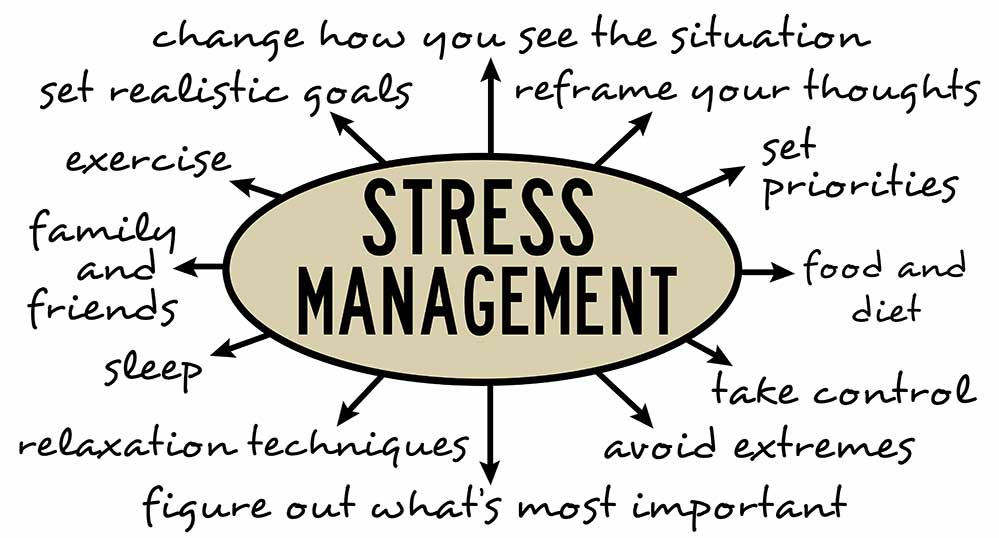Believe it or not, stress is a very normal thing. It happens to everyone. Experiencing stress is inevitable, and when managed properly, a little bit of stress can help you build more resilience and propel yourself towards more intellectual and emotional growth. However, if you have too much stress and don’t know how to manage it properly, the likelihood of the stress building up to affect you negatively is rather high. When this stress becomes chronic or constant, it turns into a problem.
Is Stress A Big Problem?
While a little stress once in a while is no big deal, having chronic stress can indeed lead to many issues. The American Heart Association (AHA) reveals that chronic stress can not only affect your physical and mental health, but also weaken your immune system, thereby causing a whole spate of illnesses. Harvard Medical School’s Health Publishing portal explains why this happens: When you get a stressful stimulus (like pending work and an impending deadline, or unpaid bills), your brain reacts to the threat of the situation by activating a fight-or-flight response. Your heart rate increases, your breathing quickens, the muscles tense up and you may even experience sweating – could be a hot or cold sweat.
In addition to these physiological reactions, your brain also releases neurotransmitters that in turn release a burst of hormones. A 2011 study in the Indian Journal of Endocrinology and Metabolism explains that stress can trigger the pituitary and adrenal glands into releasing the primary stress hormone, cortisol. Many studies over the last decade have shown that high levels of cortisol in the body on a regular basis can lead to serious health issues like hypertension, heart disease, type-2 diabetes, osteoporosis and even weight gain. The 2011 study also explains that other hormones flood the system as well when you have chronic stress, like catecholamines, vasopressin, gonadotropins, insulin, thyroid hormones and the growth hormone—all of which can have adverse and long-term effects on your health.
So, if you experience chronic stress without being able to go back to a normal, relaxed state of mind and body, it will lead to health issues—both mental and physical—for you in the long term. Therefore, being able to manage stress is a key life skill you need to learn to be able to prevent all of these health issues.

Stress Management & The Pandemic Impact
There can be many causes behind chronic stress, depending on your life and lifestyle—and sometimes even your gender. But no matter what the cause of stress, the cost you pay can be high and heavy if you don’t address it. The COVID-19 pandemic, which has wreaked havoc in all of our lives since 2020, has had a huge impact on the stress we experience. It has increased our stress about health, hygiene, family, social isolation and economies on the one hand. On the other hand, it has made the global community realise collectively that stress is an inescapable part of life and we all need to learn how to cope with it better. Now, standing in 2022 and still coping with the ongoing pandemic, the need for stress management tools is more important than ever before.
But before you jump in, it’s important to understand that stress management techniques don’t come in a one-size-fits-all format. Yes, there are a few key steps that a stress management plan should have, but the best way to go about it is to speak to a professional about your particular stressors and tailor a plan that works best for you. When you start out, the AHA recommends you ask yourself the following:
• Is my stress level too high? Is it so high that it’s leading to disturbances in my life as well as in those of others around me? Be honest with yourself and this question will help you consider your situation objectively while also making you more aware of your mental health condition.
• If my stress is indeed too high, what is causing it? Asking this question and understanding the answer will help you identify your triggers best. It’s important while you consider this question that you think about your own experiences and realities instead of focusing on what others expect of you, because such expectations can be additional stressors themselves.
• Is my stressor in my control or beyond it? Asking this question will help you build perspective and immediately show you what you can or cannot do. If you’re worried about things you can’t change, then is there any point in worrying about them at all? For example, if a family member living with you has COVID, it will generate stress for sure. But making COVID go away is not in your control, so stressing about it won’t help. Instead, focus on the steps you can take to minimise the spread of COVID in your family and to help the loved one recover faster and better.
How To Make A Daily Stress Plan
Once you have used the steps above to understand your stress levels, stressors and gotten some perspective on what you can do about it, it’s time to reach out for help. It’s always good to confide in friends and family about how you are feeling—this will help them open up to you about the stress they face too. But an even more effective method is to talk to a mental health professional so that you can create a stress plan suited to your needs. However, if you feel your stress levels are not out of control, and you can come up with a healthy method of managing stress, then do so.
As a 2020 study in the journal Healthcare suggests, we live in a digital world and now, devices like smart bands or watches along with a systematic approach to handling stress positively, can indeed help you create a stress management plan that works. How to go about it? Johns Hopkins Medicine, one of the world’s leading medical systems, suggests a six-step process that you can apply every day. Take a look:

Reframe your thinking
As mentioned before, stress has a huge value if handled positively—the experts at Johns Hopkins call it “stress’s evolutionary value”. At its very core, stress is meant to enhance your performance, so shift your thinking about it. Don’t let the thought of stress bog you down and make you feel helpless. Instead, take the moments of each day when you feel the most stressed and convert them into opportunities. Note down what a particular stressor can teach you, or how you can change the situation to your benefit. Then, take charge of the situation and act on your plan. Once you turn a stressful situation into a moment you handled well, you will definitely feel more positive about it and be more prepared to handle similar situations in the future.
Locate your triggers
Identifying your triggers is a key part of a stress management plan. However, most of us tend to identify them in retrospect, and not while the triggering incident is happening. And while that’s perfectly okay, you need to realise that preventing or reducing your triggers can help you a long way in preventing stress. In some cases—especially when the triggers recur—you can indeed take charge of a situation and stop the trigger short. This is especially applicable if your triggers are related to certain people or situations. For example, if an individual is reminding you of past or current stressors, cut them short instead of letting them go on to increase your trauma. If a particular person mostly triggers stress in you, then reframe your expectations from them and minimise contact to safeguard yourself. And this is where the third step comes in.
Build back better relationships
Whether at work, at home or in our communities, we all have people and relationships who are more toxic than anything else. Their presence and constant triggering can create a daily stressful situation, perhaps even to the extent that you take to avoiding socialisation completely in order to avoid them. This lack of socialisation can further add to your stress instead of dissipating it. So, take charge and focus your time and attention on positive reinforcements instead. Build on the foundations of the positive relations in your life, whether it’s with a friend, a relative, a neighbour, a colleague, or even your own faith. Replacing the stressful element with a positive element in your life will help you feel more relaxed, positive and in control in your daily life, thereby leading to resilience.
Get active
Everyone has only 24 hours in a day, but you need to know that being physically active and taking care of your sleep and nutrition are critical parts of that day. Your stress management plan is useless without designated times and routine regarding these. Exercise, it is very well known, is a brilliant outlet for stress and can also help you stay physically fit. Enjoying a meal can not only replenish your body, but also your mind and soul. And getting seven to eight hours of sleep every day can help your brain build the resilience it needs to deal with stress. So, get active and include all three in your plan properly.
Pause, rest, reset
You are not a machine and cannot go on non-stop. In fact, even machines need to be rested time and again so that they can function properly. During the peak of a stressful situation, you might feel that stepping away or hitting the pause button can lead to excess stress later. But, in fact, taking regular breaks—if short—every day is one of the best ways to sneak in some rest for your mind and body. Hitting the pause button for five minutes every hour to just shut your eyes and practice mindfulness can help you feel more rested. It can also help you feel like you’ve rebooted your systems after pushing the reset button, and a fresh opportunity is at hand.